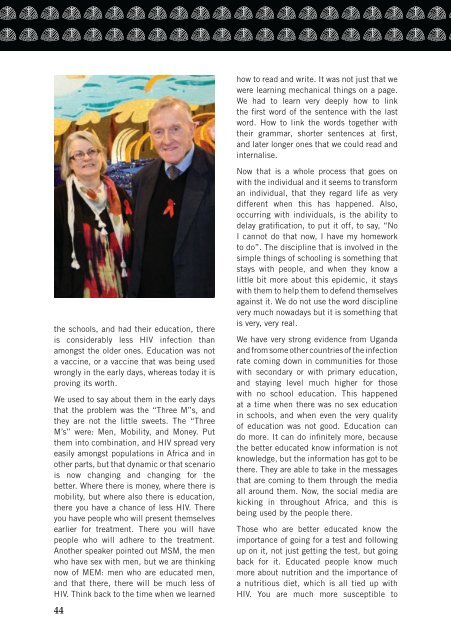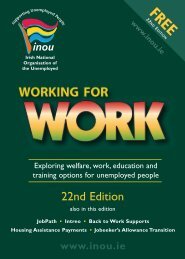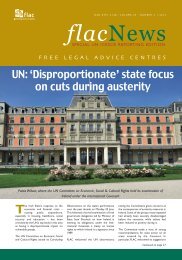HIV & AIDS-A Deep Human Concern
Create successful ePaper yourself
Turn your PDF publications into a flip-book with our unique Google optimized e-Paper software.
how to read and write. It was not just that we<br />
were learning mechanical things on a page.<br />
We had to learn very deeply how to link<br />
the first word of the sentence with the last<br />
word. How to link the words together with<br />
their grammar, shorter sentences at first,<br />
and later longer ones that we could read and<br />
internalise.<br />
the schools, and had their education, there<br />
is considerably less <strong>HIV</strong> infection than<br />
amongst the older ones. Education was not<br />
a vaccine, or a vaccine that was being used<br />
wrongly in the early days, whereas today it is<br />
proving its worth.<br />
We used to say about them in the early days<br />
that the problem was the “Three M”s, and<br />
they are not the little sweets. The “Three<br />
M’s” were: Men, Mobility, and Money. Put<br />
them into combination, and <strong>HIV</strong> spread very<br />
easily amongst populations in Africa and in<br />
other parts, but that dynamic or that scenario<br />
is now changing and changing for the<br />
better. Where there is money, where there is<br />
mobility, but where also there is education,<br />
there you have a chance of less <strong>HIV</strong>. There<br />
you have people who will present themselves<br />
earlier for treatment. There you will have<br />
people who will adhere to the treatment.<br />
Another speaker pointed out MSM, the men<br />
who have sex with men, but we are thinking<br />
now of MEM: men who are educated men,<br />
and that there, there will be much less of<br />
<strong>HIV</strong>. Think back to the time when we learned<br />
44<br />
Now that is a whole process that goes on<br />
with the individual and it seems to transform<br />
an individual, that they regard life as very<br />
different when this has happened. Also,<br />
occurring with individuals, is the ability to<br />
delay gratification, to put it off, to say, “No<br />
I cannot do that now, I have my homework<br />
to do”. The discipline that is involved in the<br />
simple things of schooling is something that<br />
stays with people, and when they know a<br />
little bit more about this epidemic, it stays<br />
with them to help them to defend themselves<br />
against it. We do not use the word discipline<br />
very much nowadays but it is something that<br />
is very, very real.<br />
We have very strong evidence from Uganda<br />
and from some other countries of the infection<br />
rate coming down in communities for those<br />
with secondary or with primary education,<br />
and staying level much higher for those<br />
with no school education. This happened<br />
at a time when there was no sex education<br />
in schools, and when even the very quality<br />
of education was not good. Education can<br />
do more. It can do infinitely more, because<br />
the better educated know information is not<br />
knowledge, but the information has got to be<br />
there. They are able to take in the messages<br />
that are coming to them through the media<br />
all around them. Now, the social media are<br />
kicking in throughout Africa, and this is<br />
being used by the people there.<br />
Those who are better educated know the<br />
importance of going for a test and following<br />
up on it, not just getting the test, but going<br />
back for it. Educated people know much<br />
more about nutrition and the importance of<br />
a nutritious diet, which is all tied up with<br />
<strong>HIV</strong>. You are much more susceptible to





